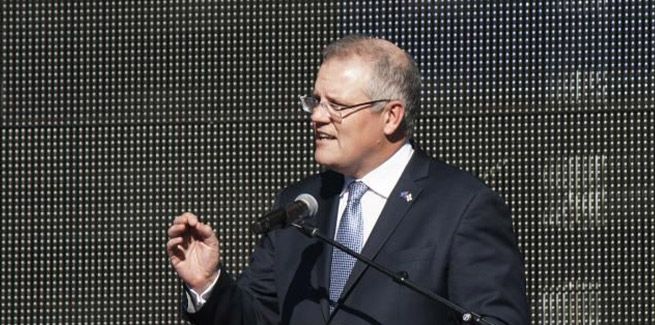Under the proposed Super Home Buyer Scheme announced by Prime Minister Scott Morrison, first home buyers would be able to invest up to 40 per cent of their super, up to a maximum of $50,000, to help with the purchase of their first property.
The scheme would apply to both new and existing homes with the invested amount to be returned to the buyer’s super fund when the house is sold, including a share of any capital gain.
There are no income or property caps under the scheme, with eligibility restricted to first home buyers who must have separately saved 5 per cent of the deposit.
The Liberal Party believes the move could slash the time taken to save a deposit by three years, as research from ANZ and CoreLogic last week showed the median time to save a housing deposit has blown out to a record 11.4 years across Australia.
If the Coalition is re-elected into power, the Super Home Buyer Scheme is expected to start from 1 July next year.
Mr Morrison commented super “should be harnessed to support the aspiration of many thousands of families who want to buy a home”.
“Our plan makes it easier for first home buyers to save for a deposit, reducing the time people need to pay rent, and also means a smaller mortgage with less debt and smaller repayments,” Mr Morrison said.
“It’s a plan that gets the balance right – it utilises money that’s currently locked away to transform a family’s life, with the money then responsibly returned to the super fund at the time of home’s sale.”
Assistant Treasurer and Minister for Housing, Michael Sukkar, added the scheme would be a game changer for aspiring buyers.
“Allowing your super to work for you to purchase your first home and then being returned to your super at a later date achieves the best of both worlds – home ownership and retirement security,” Mr Sukkar said.
Superannuation minister concedes scheme would escalate house prices
However, the proposed scheme has come under scrutiny, with fears that it will escalate property prices and leave consumers worse off in retirement.
An analysis from CoreLogic found that for Australians in the 25-34 age bracket with a median super balance of $25,000, a 40 per cent withdrawal threshold to their super would only let them take out around $10,000.
That would only cover around 1 per cent of a housing deposit, CoreLogic calculated, as the median dwelling value in Australia is now $748,653.
Minister for superannuation, Jane Hume, also admitted that the scheme would push up house prices during an interview with ABC’s Radio National on Monday (16 May).
“I would imagine that there would be a lot of people who bring forward their decision to buy a house, so I would imagine in the short-term, you might see a bump in house prices,” Ms Hume said.
“But that doesn’t play out the long-term benefits of more home ownership, fewer people relying on rent.”
The idea of using super for housing has been pushed by various Liberal backbenchers in recent years, including MP Tim Wilson and senator Andrew Bragg, but it has never gained traction until now.
In February last year, Ms Hume denied that the government was considering the idea at the time, commenting it wanted Australians to “have the best retirement outcomes possible”.
Downsizers and pensioners also targeted
The first home buyer measure has also been coupled with another initiative hoping to free up larger housing stock for younger buyers.
The Coalition has promised to lower the minimum age for its superannuation scheme incentivising pensioners to downsize their property.
Aussies over the age of 55 would be able to downsize their property and invest up to $300,000 from the proceeds of the sale into their superannuation fund outside of the existing contribution caps.
Currently the scheme is only open to Australians over the age of 65, although it is set to lower to 60 from July.
The new lowered age limit would instead commence from July.
Pensioners who downsize will also be able to exempt the proceeds of the sale from the assets test for longer.
They would be able to structure their assets for two years following the sale of their home without impacting their pension, double the previous amount of time.
The measure would come into force under a re-elected Morrison government from the start of 2023.
The party has estimated that up to 1.3 million empty-nesters and pensioners would be able to now access the incentives to downsize.
Mr Morrison commented the move would remove financial barriers for people wanting to downsize.
“By removing barriers for Australians downsizing to residences that better suit their needs and lifestyle, we are helping to free up larger homes for younger families,” he said.
Mr Sukkar added: “These changes will directly help in unlocking the supply of larger homes for those younger families who are hoping to expand, and at the same time incentivise older Australians to downsize by putting more into their super.
“By releasing more supply of larger houses, we are providing more choice for families.”
The housing measures would add to the government’s recent expansion of the Home Guarantee Scheme, which will have 50,000 places, including 10,000 places for new homes in regional Australia.
There is also an existing measure, the First Home Super Saver Scheme, which allows people to dock savings towards for a housing deposit with their super fund and to use the concessional tax treatment for super.
Meanwhile the Labor party has pledged to roll out a shared equity scheme if it wins the election, where the government would buy up to a 40 per cent stake in a borrower's home.
[Related: 41.4% of mortgage needed to service mortgage, finds report]

